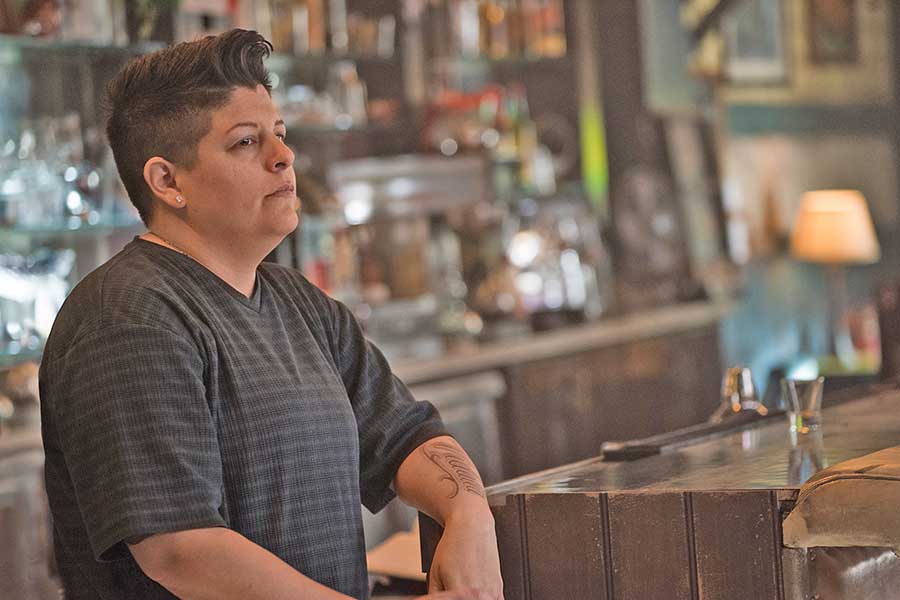“Vida” is a terrific new drama series that showcases Latinx lesbian life in Los Angeles.
The show, which premieres on Starz, opens with Emma (Mishel Prada) returning to East Los Angeles following the death of her mother, Vida. Emma has not seen her sexpot sister, Lyn (Melissa Barrera), in years, and she didn’t know her mother had married Eddy (the non-binary Ser Anzoategui).
As Emma, Lyn and Eddy each inherit a third of the bar Vida owned in the building where she and Eddy lived, the three also inherit the mounting debt. This prompts Emma to consider selling what has become a safe space for Eddy and members of the local queer community. Of course, drama ensues.
Anzoategui, in a breakout performance, is especially impressive as the show’s grounded, moral center. Eddy still communicates with the late Vida and — despite her differences with the sisters — has everyone’s best interests at heart.
In a recent phone interview, Anzoategui explained how they* came to play Eddy. “The show’s bar is loosely based on a bar in the East Side of L.A. Tanya [Saracho, the series’ creator] is a playwright, and she saw me in a play and contacted me. I could understand Eddy’s suffering, and her love, and the need to connect. We have that need to bring people together in common.”
One of the ways Eddy brings people together is by creating a safe space in the bar Vida once owned. “I think the bar is the only place where people who are masculine-presenting, queer and live in the community can go,” said Anzoategui. “You can be homeless or unemployed because of how you present. Eddy would take people in and provide a sense of love they didn’t have. The show asks: How do they live together?”
Eddy tries to bond with Lyn and Emma is through food. Flan in “Vida” is what cheesecake was to “The Golden Girls.”
Anzoategui laughed at the comparison and said, “Flan can make any heart melt with one spoon. It’s how Eddy softens up Emma. I grew up with my mom being a flan queen.”
They also smoke a cigar in one of the show’s best scenes, where Eddy recalls her late wife. Anzoategui confessed that they had never smoked a cigar before. “I watched a video to see how to look like I’ve done this for a while. They gave me a natural cigar. It was spicy and itchy. I had to scrape my tongue after every take. It was disgusting.”
The scene is important because of what Eddy says while smoking. She talks about Vida saving the good stuff in life for later. But Vida never got to share that later with Eddy. Anzoategui explained this concept is a very Latinx thing.
“I feel like we save the good stuff in that we hoard. It’s that we fear we won’t have it for later.”
One of the things Anzoategui savored in the making “Vida” was working with Rose Troche, the director and cowriter of the classic lesbian film “Go Fish.”
“She’s ahead of her time in her execution as a director and what stories are important and how and what and ways of shooting it. She’s directing the sex scene, but it’s done well by a Latina queer woman.”
“Vida” is notable for its depiction of queer Latinx women, and the show does not shy away from using Spanish slang like “tortillera” (a pejorative term; an insult to the lesbian community) to stay authentic.
The show presents “different experiences of gender, sexual orientation and identification,” said Anzoategui. “There is a lot of machismo/a in the Latina community. Women contribute to it too. It’s a reflection — this is real. Sometimes we’re machisma and racist. ‘Vida’ reflects it back.”
*Anzoategui uses the gender pronoun “they” but speaks about Eddy (their character) as “she.”
